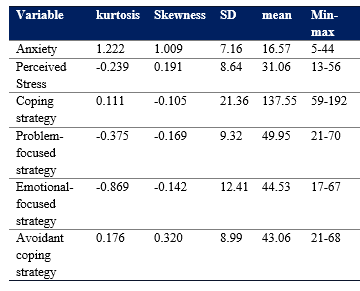Investigating the relationship between anxiety and perceived stress with coping strategies adopted in pregnant women during the COVID-19 pandemic
stress by pregnant women in the COVID-19 pandemic
Keywords:
Coping strategies, Anxiety, perceived stress, self-care, coronavirus, coping, strategies, Perceived stress, Self-care, CoronavirusAbstract
Introduction: The COVID-19 pandemic has led to mental problems, including stress and anxiety, for people, especially pregnant women. Identifying strategies to deal with stress is important and can help pregnant mothers to adapt to stressful life factors such as the conditions of the COVID-19 pandemic. The present study was designed and implemented to investigate the relationship between anxiety and perceived- stress with the coping strategies of pregnant women referring to Al-Zahra Hospital in Rasht.
Methods: The current study was conducted on 221 pregnant women using a cross-sectional analysis method. The required information was collected by the self-report method through demographic questionnaires, Corona disease anxiety (CDAS), Cohen's perceived stress, and Endler and Parker's coping strategies questionnaire. Data were analyzed using SPSS version 22 software using Spearman's correlation coefficient and linear regression tests. The significance level of the tests was considered as P < 0.05.
Results: 53.4% of women had moderate anxiety and 60.6% of pregnant women had high levels of perceived stress. There was a direct and significant correlation between anxiety-perceived stress and emotion-focused strategy (P<0.001).
Conclusion: The present study showed high perceived stress and moderate anxiety in pregnant women during the COVID-19 pandemic and their relationship with emotion-focused coping strategies.

Additional Files
Published
How to Cite
License
Copyright (c) 2023 Fatemeh Shabani , Seyedeh Hajar Sharami, Roya Faraji, Habib Eslami-Kenarsari, Asiyeh Namazi

This work is licensed under a Creative Commons Attribution-NonCommercial 4.0 International License.
